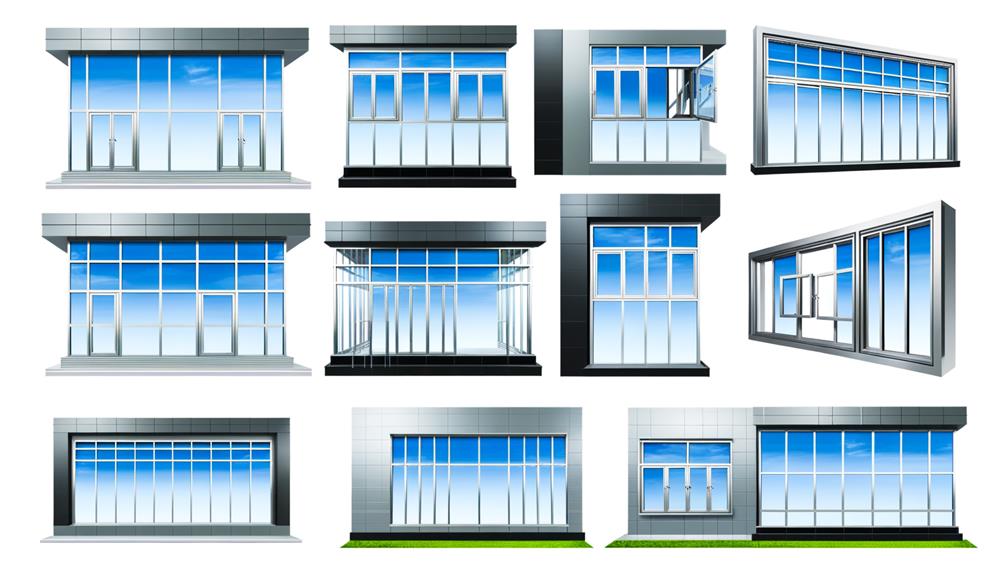Table of Contents
For exceptional commercial durability, it’s important to consider three types of windows: aluminum frame, vinyl, and fiberglass. Aluminum frames are known for their strength, flexibility, and resistance to corrosion, requiring minimal maintenance. Vinyl windows shine in terms of energy efficiency and durability, and they hold up well against harsh weather conditions. Lastly, fiberglass windows are resistant to warping, swelling, and rotting due to their unique composition of glass fibers and resin. Each type has distinct qualities that cater to different needs, so it’s worth exploring their capabilities to enhance your commercial space.
Aluminum Frame Windows: Commercial Durability
When you’re seeking commercial durability, aluminum frame windows offer an unmatched blend of strength, flexibility, and corrosion resistance. Compared to steel frames, aluminum frames aren’t only lighter but also resistant to rust, making them ideal for regions with high humidity or rainfall.
Aluminum versus steel frames is no competition when it comes to maintenance. Steel frames can corrode over time, requiring regular upkeep. On the other hand, aluminum windows need minimal maintenance, thanks to their inherent corrosion resistance. This makes them a long-lasting choice for commercial buildings.
Maintenance tips for aluminum windows are straightforward. Regular cleaning with a soft cloth and mild detergent will keep your windows looking new. Avoid abrasive cleaners which can scratch and dull the surface. Check the weather-stripping and seals annually, replacing them as needed to ensure peak performance.
Aluminum frames can be easily customized to meet aesthetic requirements while providing superior durability. They can be anodized for color stability or powder-coated for a finished look. This flexibility, combined with their strength and low maintenance, makes aluminum frame windows a wise choice for commercial applications.
Vinyl Windows in Commercial Buildings
Switching to vinyl windows in commercial buildings can provide you with notable energy efficiency and impressive durability, all wrapped up in a cost-effective package. These windows are designed to withstand harsh weather conditions, reducing the need for frequent replacements. They’re also thermally superior, notably reducing heat transfer and, in turn, your energy bills.
Apart from their technical prowess, vinyl windows offer a high degree of aesthetic appeal. They’re available in a variety of styles, sizes, and colors, allowing you to pick the perfect fit for your building’s architectural design.
To summarize, here are key advantages of using vinyl windows in commercial buildings:
- High energy efficiency: Vinyl windows offer superior insulation, keeping your building warm in winter and cool in summer.
- Aesthetic appeal: With a wide variety of styles, sizes, and colors, vinyl windows can enhance your building’s visual appeal.
- Low maintenance: Vinyl windows require minimal cleaning and don’t need to be painted or stained.
- Cost-effective: Despite their superior performance, vinyl windows are more affordable than many other window types.
- Impressive durability: These windows can withstand harsh weather conditions, reducing the need for replacements.
The Durability of Fiberglass Windows
While vinyl windows offer a range of benefits, you’ll also find that fiberglass windows stand a notch above when it comes to durability. Fiberglass window benefits extend beyond their long-lasting nature. They’re robust, resistant to warping, swelling, and rotting, making them a superb choice for commercial settings.
Fiberglass windows are constructed from glass fibers and resin, materials known for their strength and stability. This makes them highly resistant to the harsh elements of weather, ensuring they maintain their shape and function over time. The durability of fiberglass windows is further enhanced by their ability to withstand wide temperature fluctuations without expanding or contracting, which can lead to window damage in other materials.
When it comes to fiberglass window maintenance tips, you’ll find these windows are relatively low-maintenance. They don’t require painting or staining and can easily be cleaned with mild soap and water. Additionally, they’re energy efficient, contributing to lower heating and cooling costs.
Over time, the combination of low maintenance, energy efficiency, and durability can result in significant cost savings, making fiberglass windows a worthwhile investment for your commercial building.
Conclusion
To sum up, for excellent commercial durability, consider aluminum frame, vinyl, or fiberglass windows.
Aluminum provides strength and resilience, vinyl offers superior insulation and low maintenance, while fiberglass guarantees longevity and weather resistance.
Each has unique attributes making them ideal for different situations. Therefore, it’s crucial to evaluate your specific requirements and environmental conditions before deciding.
Keep in mind, investing in the correct window type can greatly improve the longevity and functionality of your commercial building.


Leave a Reply